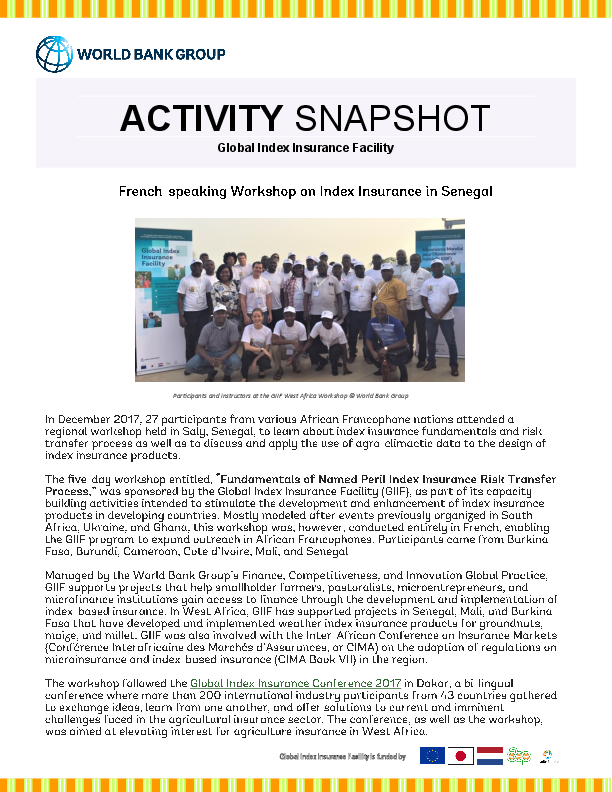French-speaking Workshop on Index Insurance in Senegal

In December 2017, 27 participants from various African Francophone nations attended a regional workshop held in Saly, Senegal, to learn about index insurance fundamentals and risk transfer process as well as to discuss and apply the use of agro-climactic data to the design of index insurance products.
The five-day workshop entitled, “Fundamentals of Named Peril Index Insurance Risk Transfer Process,” was sponsored by the Global Index Insurance Facility (GIIF), as part of its capacity-building activities intended to stimulate the development and enhancement of index insurance products in developing countries. Mostly modeled after events previously organized in South Africa, Ukraine, and Ghana, this workshop was, however, conducted entirely in French, enabling the GIIF program to expand outreach in African Francophones. Participants came from Burkina Faso, Burundi, Cameroon, Cote d’Ivoire, Mali, and Senegal
Managed by the World Bank Group’s Finance, Competitiveness, and Innovation Global Practice, GIIF supports projects that help smallholder farmers, pastoralists, microentrepreneurs, and microfinance institutions gain access to finance through the development and implementation of index-based insurance. In West Africa, GIIF has supported projects in Senegal, Mali, and Burkina Faso that have developed and implemented weather index insurance products for groundnuts, maize, and millet. GIIF was also involved with the Inter-African Conference on Insurance Markets (Conférence Interafricaine des Marchés d’Assurances, or CIMA) on the adoption of regulations on microinsurance and index-based insurance (CIMA Book VII) in the region.
The workshop followed the Global Index Insurance Conference 2017 in Dakar, a bi-lingual conference where more than 200 international industry participants from 43 countries gathered to exchange ideas, learn from one another, and offer solutions to current and imminent challenges faced in the agricultural insurance sector. The conference, as well as the workshop, was aimed at elevating interest for agriculture insurance in West Africa.
On the first day, the team from the International Research Institute for Climate and Society (IRI) led a technical session on the use of data for index insurance. The participants learned how to obtain available data and then apply them to their actuarial work.
"I learned the importance of data collection to build an agricultural index insurance product, ranging from satellite data, rain gauge data, and information gathered from the farmers concerned,” said Marie Abeng Tsendzi from Cameroon’s La Direction Nationale des Assurances. She also added, “This first step is crucial, as it allows us to focus on the basic risk and how to minimize it, resulting in the designing of models appropriate to the need of farmers.”
For the rest of the workshop, practitioners dove into Excel formulas, drafting and evaluation of term sheets, product design framework, and the development and evaluation of sample product structures – all of which generated dynamic interactions among trainees and the instructors. Ultimately, participants returned to their home country with greater confidence that index insurance is a tool that helps agriculturists in their country build financial resilience in the face of increasingly severe and frequent climate change events. GIIF’s goal is to help 8 million more individuals build resilience against growing climate risks by 2020.
“The most valuable experience from the training was the exchanges around the common topic that is index insurance, despite all of us being from different backgrounds,” said Hadaraï Rabo, General Manager of Coris Assurances SA in Burkina Faso.
“In the end, we all have the shared goal, which is to master the fundamentals of agricultural insurance and use them to strengthen the resilience of our fellow farmers,” Mr. Rabo added.
